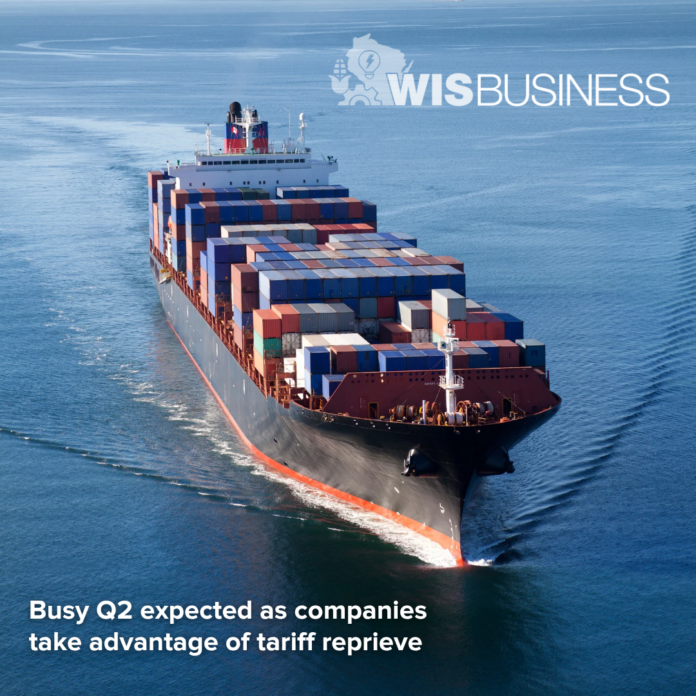The head of Milwaukee-based customs broker M.E. Dey says “it’s going to be a busy Q2” as companies rush their imports and exports during the current tariff reprieve.
Sandi Siegel, the company’s president and CEO, notes the international trade landscape remains fraught with volatility despite the U.S-UK trade deal announced earlier this month and the more recent temporary reduction in tariffs between the United States and China.
“I think what’s difficult is nobody knows,” the WisBusiness “Talking Trade” co-host said in a recent interview. “It’s a 90-day pause, so how do you plan? That’s the challenge … it’s good news, it’s just, there continues to be so much uncertainty. Because it’s all temporary and nobody knows what’s around the corner.”
Similarly, Wisconsin Manufacturers & Commerce President and CEO Kurt Bauer says “the uncertainty is the biggest challenge and obstacle” the group hears from its member businesses. In a separate interview, he said “certainty is preferable” and expressed hope that the tariff issue is resolved as soon as possible.
Bauer referenced an unnamed business in western Wisconsin that gets “critical components” from China for its manufacturing operation.
“Obviously, tariffs make the costs go up, it makes them less competitive in the global market,” he said.
Still, both Siegel and Bauer said some of the recent developments are a step in the right direction, particularly elements of the trade deal with the United Kingdom. Bauer said “it’s not just tariffs” in play, noting countries create other barriers in front of U.S. products entering their markets such as value-added taxes and other regulatory obstacles.
“The UK deal in particular seems to really be advantageous for Wisconsin and U.S. agriculture … that template applied to the EU would be very helpful to us,” he said, adding “the EU is probably the bigger barrier than the individual nations, Germany, France, etcetera. So a deal with the EU would be very helpful, and I hope that’s coming soon.”
While M.E. Dey doesn’t do much business in the UK, Siegel said the deal is “breaking down some of the non-tariff barriers” around food-related products.
“Better access for a lot of agriculture … beef, root vegetables, animal feed, stuff like that,” she said. “Much more access to the UK market, so obviously all that agriculture is great for Wisconsin.”
Many of the Milwaukee broker’s clients are taking advantage of the agreement with China to sharply reduce tariffs for a 90-day period, she noted. Siegel said some customers have had goods on hold in China in the hopes that tariffs would be lowered. Now that they have, “all of a sudden they’re ready to ship and they can’t get it out of there fast enough,” she said.
“So that’s going to drive freight rates up, and you know, a lot of scramble for space,” she said, noting importers had been “overbuying” earlier in the year amid threats over impending tariffs. Now, she says shipping volumes will pick up again while the window is open, made more urgent by the possibility it will slam shut once again.
Meanwhile, Bauer said both the UK and China deals are significant for Wisconsin manufacturing, noting many companies in the state source components and raw materials from China in particular.
“Having those barriers dropped is just important,” he said.
WMC has been tracking potential impacts from tariffs on three main areas: energy, supply chains and access to markets. He said the energy concern has been addressed for now, after a plan to tax energy imports from parts of Canada at 10% was taken off the table, noting “that would have raised prices for everything” in Wisconsin.
But concerns around supply chains remain prominent, given the state economy’s reliance on goods sourced from around the world, he said. And he emphasized the importance of continued market access for Wisconsin exports.
“We’re an agricultural state, we’re a manufacturing state. We make things, we grow things, we process things. We want to be able to sell them around the world,” he said. “Particularly where there is population growth and middle-class wealth growth, and that’s largely Asia.”
While Bauer said he’d like to get “as much certainty and clarity as we possibly can” on costs for importing and exporting products, he added WMC members have been surprisingly supportive of the Trump administration’s stated goal of trade fairness. He also said the group “can absolutely get behind” the goal of driving more U.S. manufacturing.
Bauer added some manufacturers in the state are already connecting with more domestic customers through other producers in their supply chain, as a result of the disruptions overseas.
“So there’s certainly some opportunity that our businesses, our members see, and obviously, I mean we’d like to see as much reshoring as possible,” he said.
Get more trade insights from recent episodes of “Talking Trade” here.







